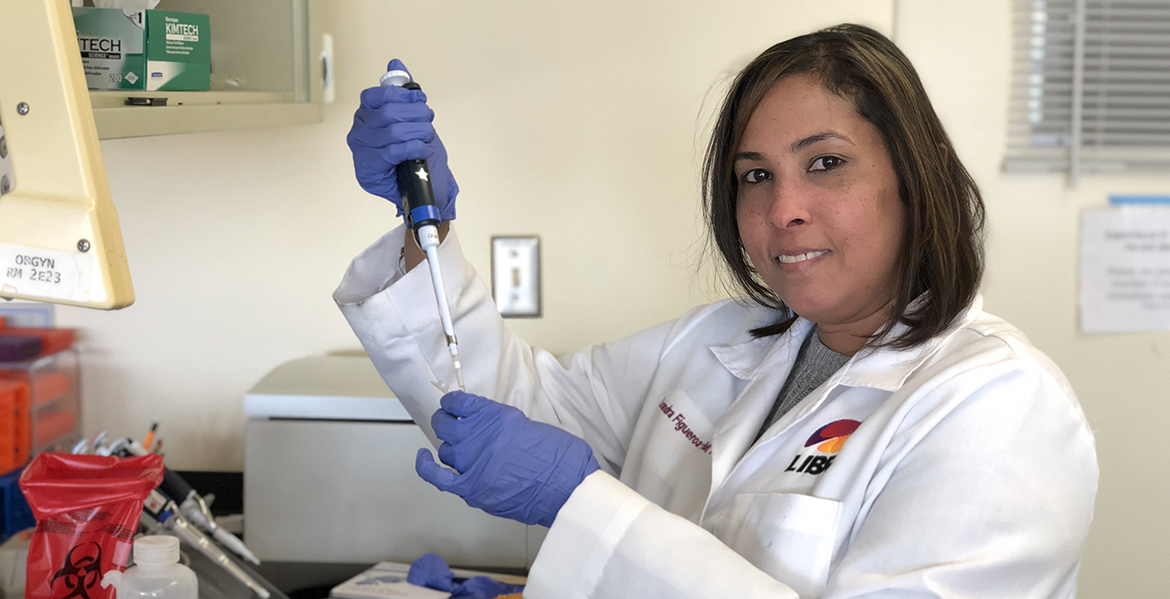
Biomedical Sciences alumna building research career
Thursday, January 16, 2020
OSU Center for Health Sciences alumna Leandra Figueroa-Hall, Ph.D., grew up in a place very different than Oklahoma. She was raised in the U.S. Virgin Islands to a Puerto Rican father and Trinidadian mother.
“I’m the first person in my family to get a Ph.D. My dad retired from the Army National Guard and his degree was actually in music. My mom was an accountant,” Figueroa-Hall said. “I’m the first scientist in my family.”
Her interest in science was sparked in high school and continued in college where she earned her bachelor’s degree in biology from the University of the Virgin Islands.
It was there where she began learning and studying the TLR4 protein.
When someone gets sick, it’s from a bacteria or virus and the body has two ways to fight it– through the innate immune system and the adaptive immune system, she said.
“TLR4 is part of the innate immune system, the early responders. TLR4 can identify the bacteria or virus and then creates toxins to fight it,” Figueroa-Hall said.
These responses cause inflammation, which can cause redness and pain at the site as well as fever.
"I got a passion for it my last year in undergrad. I decided I wanted to go further and get my Ph.D."
She earned her master’s in biomedical research from the University of Maryland School of Medicine. A personal relationship brought her to Tulsa, so she started looking at Ph.D. programs and was contacted by Dr. Randall Davis, interim associate dean of Biomedical Sciences and director of the Biomedical Sciences graduate program at OSU-CHS.
Davis, who is also a professor of pharmacology and runs the Neuroinflammation Research Laboratory, said he believed Figueroa-Hall would be a good fit at OSU-CHS.
“She had common research interests, came from a top-notch lab at the University of Maryland, and I believed she would strengthen our lab,” he said.
Figueroa-Hall built up her own skills in the research lab and enjoyed her time at OSU-CHS.
“I liked that it was a smaller program. It was family oriented. The professors were super helpful, and they had an open-door policy. They encouraged your ideas and your thoughts,” she said.
At OSU-CHS, Figueroa-Hall studied the effects of opioids on inflammatory signaling in the brain, Davis said.
“She was outstanding while she was here. She was a very strong student and researcher. She was meticulous and paid attention to detail. These characteristics were very helpful in the lab,” he said. “I am proud to say that Lea remains a part of the Davis family lab.”
She ended up spending seven years at OSU-CHS for several reasons both professional and personal.
“Science is so unpredictable. Eight out of 10 times it doesn’t work. There’s a lot of trial and error,” she said.
"During my time [at OSU-CHS] I got married, I had my son. He’s 5 years old now and he grew up there on campus. Everyone kind of took care of him.."
After graduating from the School of Biomedical Sciences in 2017, Figueroa-Hall moved to Connecticut for a two-year postdoctoral fellowship at Yale University. She then moved back to Tulsa to be with her family and to further her research career.
She’s now a postdoctoral research associate at Laureate Institute for Brain Research working with an investigator looking at TLR4 and how inflammation affects depression, or vice versa.
“It’s a chicken or egg scenario. In some patients, does inflammation cause depression, or does depression cause inflammation? Or are they bilateral?” Figueroa-Hall said.
The project, which began in August 2019, is still in its early stages.
“I’m not new to TLR4, but I am new to mental health. I’m reading and reviewing mental health literature and studies,” she said, but luckily the brain isn’t completely unknown to her. “I also got that foundation in neuroinflammation at OSU-CHS. All of that I learned at OSU.”
MEDIA CONTACT: Sara Plummer | Communications Coordinator | 918-561-1282 | sara.plummer@okstate.edu
